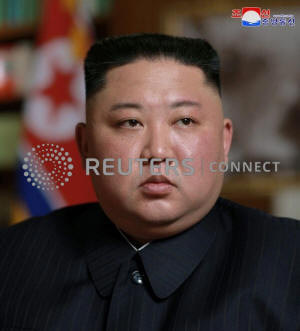|
Kim Jong Un consolidates power as North
Korea shuffles leadership
 Send a link to a friend
Send a link to a friend
 [April 12, 2019]
By Joyce Lee and Josh Smith [April 12, 2019]
By Joyce Lee and Josh Smith
SEOUL (Reuters) - In one of the biggest
leadership shake-ups in years, North Korea named a new nominal head of
state and a new premier, and gave leader Kim Jong Un a new title, state
media reported on Friday, moves analysts said solidify Kim's grip on
power.
In an expected move, Kim Jong Un was re-elected as chairman of the State
Affairs Commission at a session of North Korea's rubber-stamp
legislature that took place on Thursday, Korean Central News Agency (KCNA)
said.
For the first time, however, state media referred to Kim as "supreme
representative of all the Korean people." That title was approved by
special decree in February, according to the Associated Press, but has
not been used publicly until Friday.
It's unclear whether the changes will be codified in the constitution,
but analysts said the shake-up shows Kim has fully come into his own,
eight years after he inherited rule from his father, Kim Jong Il.
"The transition and power consolidation of the Kim Jong Un regime is
complete," said Michael Madden, a nonresident North Korea leadership
expert with the Stimson Center, a Washington-based think tank.
"This is probably the largest party-government shake-up in many years,"
he said.

Since early 2018 Kim has embarked on a push for economic development and
international engagement, including historic summits with the leaders of
the United States, China and South Korea.
In a message congratulating Kim on his re-election as chairman, Chinese
President Xi Jinping said China highly values its friendship with North
Korea and is willing to push forward the bilateral relations, China's
foreign ministry said on Friday.
Choe Ryong Hae was named President of the Presidium of the Supreme
People's Assembly of North Korea, replacing Kim Yong Nam.
The person holding that position is constitutionally considered North
Korea's head of state and usually represents the country at diplomatic
events, though experts say real power remains concentrated in Kim Jong
Un's hands.
Kim Yong Nam, who was born in 1928, has been one of the longest serving
senior officials, having held the position since it was created for him
in 1998, Madden said.
His replacement, Choe, was subjected to political "re-education" in the
past, but in recent years appeared to be gaining more influence since he
was promoted in October 2017 to the party's powerful Central Military
Commission, South Korean intelligence officials previously said.
 
Choe was one of the three officials sanctioned by the United States in
December over allegations of rights abuses.
On Thursday U.S. President Donald Trump, who has had two summits with
Kim to discuss North Korean denuclearization and has expressed his
willingness for a third, said Washington would leave sanctions in place.
[to top of second column]

|

North Korean leader Kim Jong Un is elected as Chairman of the State
Affairs Commission of the Democratic People's Republic of Korea at
the first session of the 14th Supreme People's Assembly (SPA) in
Pyongyang April 11, 2019 photo released on April 12, 2019 by North
Korea's Korean Central News Agency (KCNA). KCNA via REUTERS

Several officials who have played leading roles in negotiations with
the United States were also promoted, including Choe Son Hui, who
was named first vice foreign minister and a member of the State
Affairs Commission.
ECONOMIC REFORMS
North Korea also replaced the premier of its cabinet, an official at
the center of efforts to jumpstart the economy.
Leader Kim Jong Un has made economic development the centerpiece of
his strategy and told officials this week that building a
self-supporting economy would be a blow to the "hostile forces" that
have imposed sanctions on the North Korea.
Pak Pong Ju had served his current post as premier since 2013.
According to analysts at NK News, a website that monitors North
Korea, Pak helped oversee a process of "radical reform" in the
economy that enabled it to survive sanctions.
Among those reforms were loosing control of state-run enterprises,
allowing them to operate more freely in the market and to seek
private investment, according to a 2017 profile of Pak in NK News.
Some of those reforms earned the ire of Kim Jong Un's father, Kim
Jong Il, who led North Korea at the time. But the younger Kim has
more openly embraced many of those market changes, and North Korea
has sought to ease sanctions and attract more private investment.

Pak will now serve as a vice chairman of the ruling party, meaning
that those economic reforms are still being embraced, said Hong Min,
senior researcher of Korea Institute for National Unification in
Seoul.
"It means Pak Pong Ju-nomics, or Pak Pong Ju-style economic reform
is continuing," he said.
There is little known about Pak's replacement, Kim Jae Ryong, who
has been serving as a party leader in Jagang Province, a mountainous
area home to some munitions factories.
The province is known within North Korea, however, for having a
spirit of overcoming hardship, which may fit with Kim Jong Un's
message of persevering under sanctions, Hong said.
(Reporting by Joyce Lee and Josh Smith; Additional reporting by
Hyonhee Shin; Editing by James Dalgleish, Grant McCool and Michael
Perry)
[© 2019 Thomson Reuters. All rights
reserved.]
Copyright 2019 Reuters. All rights reserved. This material may not be published,
broadcast, rewritten or redistributed.
Thompson Reuters is solely responsible for this content. |